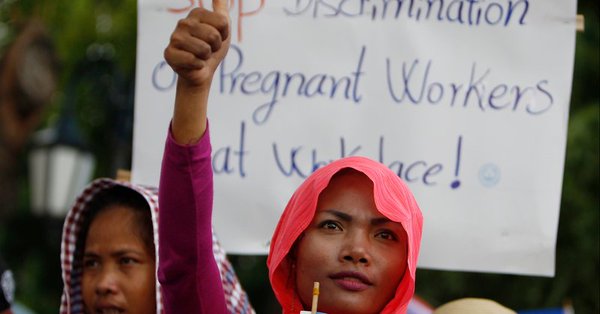MANILA, Philippines (AP) — Workers and activists marked May Day on Tuesday with rallies to demand their government address labor issues.
International Workers’ Day is a public holiday in many countries, though activities are restricted in some places, sometimes leading to confrontations.

A Cambodian worker attends a gathering to mark May Day at Tonle Sap river bank, in Phnom Penh, Cambodia, Tuesday, May 1, 2018. Some hundreds of workers staged a rally, demanding a better working condition. (Photo: AP)
A look at some of the events around the world:
TURKEY
Police in Istanbul detained more than a dozen demonstrators who tried to march toward Istanbul’s symbolic main square in defiance of a ban.
Turkey declared Taksim Square off-limits to May Day celebrations citing security concerns. Roads leading to the square were blocked and police allowed only small groups of labor union representatives to lay wreaths at a monument there.
Still, a group of some 25 people, chanting “Taksim cannot be off limits on May 1” tried to push their way into the square but were rounded up by riot police.
Major trade unions were scheduled to mark the day with rallies at government-designated areas in Istanbul and Ankara.
Taksim holds a symbolic value for Turkey’s labor movement. In 1977, 34 people were killed there during a May Day event when shots were fired into the crowd from a nearby building.
PHILIPPINES
About 5,000 people from various groups rallied near the presidential palace in Manila to protest the failure of Philippine President Rodrigo Duterte to fulfill a major campaign promise to end contractualization, the widespread practice of short-term employment.
The protesters also demanded that the government address issues including low wages, unemployment and trade union repression.
SOUTH KOREA
Thousands of labor union members rallied in downtown Seoul for a higher minimum wage and other demands.
They chanted slogans urging the government to implement a 10,000 won ($9.34) minimum wage and convert all non-regular employees to regular workers with equal pay and treatment.
The rally was organized by the Korean Confederation of Trade Unions. The police estimated the crowd at 10,000 people.
The union members also demanded that the government scrap the restructuring of the shipbuilding and automobile industries, and reform the huge conglomerates that dominate the South Korean economy.
INDONESIA
About 10,000 workers from various labor groups rallied near the presidential palace in Jakarta to voice their demands.
Most of the workers came from Jakarta and nearby suburbs, but some traveled from West Java and Surabaya.
The protesters urged the government to avoid outsourcing, and to raise their wages. They also asked the government to stop foreign laborers from working in Indonesia, saying it decreases employment opportunities for local workers.
CAMBODIA
About 2,000 garment workers gathered at a park in Cambodia’s capital, Phnom Penh, for a rally organized by a garment union coalition.
The workers wanted to march to the National Assembly to urge lawmakers to help them address labor-related concerns, but the group was stopped by riot police.
Prime Minister Hun Sun spent May Day with some 5,000 garment workers just outside Phnom Penh. He thanked the workers by announcing that each of them will receive 50,000 riel ($12.50). With a general election coming up in July, Hun Sen for the past year has been courting the large bloc of garment workers, whose unions traditionally have been strong supporters of the opposition.


